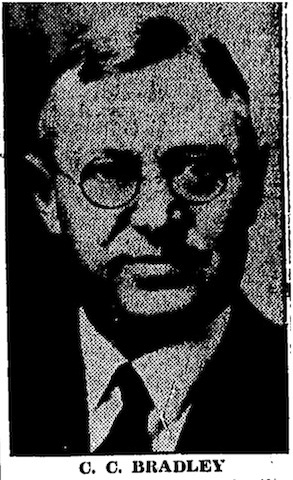

Bradley, Charles C. 1870-1939 

BRADLEY
Posted By: Mary Holub, volunteer (email)
Date: 9/22/2010 at 08:04:15
From: Le Mars Globe-Post, July 27, 1939
Name Was In World Headlines Five Years Ago
C. C. Bradley, former district court judge, whose name was in headlines all over the world a few years ago, died Wednesday morning in his home here, of a heart disease and, complications which forced his retirement from the bench in 1933.
He is survived by one brother, Darwin Bradley of Topeka, Kansas.
Funeral services will be held at 2:30 o'clock at his home at 500 First Ave. S. W. on Friday after noon, with Rev. Shaner officiating. Burial will be at the city cemetery, under direction of Wiltgen's funeral home. The body will lie in state at Wiltgen's until Friday morning.
Born In 1870
Charles C. Bradley was born on May 27, 1879, and graduated from the law school at the University of Iowa in 1898. He came to Le Mars in 1901 as a member of the law firm of Sammis & Bradley, replacing Mr. Scott, who took up a law office in Sioux City. On the death of Mr. Sammis, he joined Phil A. Boland in the law partnership of Boland & Bradley. Mr. Boland died in 1907 and Bradley practiced alone under the firm name of Sammis & Bradley. In 1915, upon the death of Judge Boles, he was elected to the bench, where he served until 1933, shortly after an attack was made on him by a mob consisting of some Plymouth county farmers and some outside agitators, believed to be communists. He moved to Des Moines, where Federal Judge Dewey appointed him receiver of an insurance company that was in liquidation, and he continued in this work until poor health forced him to resign and return to Le Mars.
Chance Remark Blamed
The attack on Judge Bradley while he sat on the bench was the culmination of a series of violent protests by farmers and landowners against wholesale foreclosures, and their attendant efficiency judgments, and catapulted Judge Bradley over night to a position of national prominence. The attack on him was significant not only as the first overt revolutionary act in the farm uprising, but also because it marked the loss of control of the farm holiday movement by the farmers, and its passing into other hands, who discredited the original farmers with the public.
Nevertheless, while the attack on Judge Bradley was undoubtedly inspired by outside agitators, of whom "Mother Bloor" was one of the more distinguished Communists, all of those who were caught and tried in the subsequent military occupation were residents of Plymouth county or nearby territory. Many of them were bona fide farmers.
The attack came after a mob had broken up a sheriff's sale at Primghar, and had come to Le Mars to take practical control of the town. They put pressure on some land-owners here, seemed to come to an amicable settlement, and then the word was passed that Judge Bradley was at the court house.
"Shock troops" were selected, and they invaded the court house, but in an orderly manner, about 5 o'clock, just as Judge Bradley was about to adjourn court. They filled the court room, and a spokesman for the group asked the judge to promise that he would not sign any more foreclosure orders.
Bradley Declines
Judge Bradley said he had as much sympathy for the dispossed farmers as anyone, but that he did not make the laws. He said he could not refuse a foreclosure if proper application were made.
After a few more words the conversation became heated, until the judge exclaimed sharply;
"This is my court!"
At this a roar went up. "Get him!" someone shouted, and in a moment half a dozen men had seized the judge.
They did not drag him off the bench immediately, but accused him of stating, in a speech at a bar meeting at Storm Lake, that the Holidayers were "hoodlums."
Presently the cry went up that he should be lynched, and Bradley was dragged out of the court house, placed in a truck commandered for the purpose, and taken to the crossroads southeast of town. Here the judge was alternately threatened, cajoled, and humiliated, but steadfastly held to his original statement that he could not change the law. A rope was actually placed around his neck and thrown over a cross-arm of an electric light pole. The judge was partly lifted, so that he stood on tiptoe, but when the mob saw that he would allow, himself to be choked before he would yield, they let him down again.
Finally, when all else had failed to get the desired results, they told him to pray. He said a short prayer for his captors, and asked divine guidance for himself toiled him in doing "justice toward all." His demeanor during that trying hour was such as to win the grudging respect of the very men who were manhandling him, and later, when it became known to others, the admiration of the world.
Judge Bradley was released, a little after 6 o'clock when the word circulated among the mob that he suffered from a bad heart condition, and might die. He was able to walk to a truck that had been stopped on the road, and rode into Le Mars. By the next morning Plymouth county and surrounding areas were under martial law, and military trucks were scouring the countryside for suspected participants in the outrage. Some of the first men to be picked up, appalled by what they had taken part in, confessed freely, involving everybody else, and a military court of inquiry soon knew everything about northwest Iowa's "pocket revolution," with which Judge Bradley's name will always be linked by historians.

Plymouth Obituaries maintained by Linda Ziemann.
WebBBS 4.33 Genealogy Modification Package by WebJourneymen